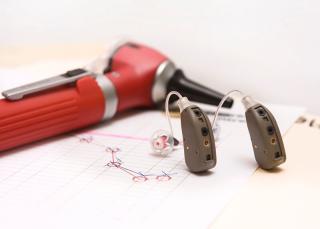How Long Do Hearing Aids Last?

3 min read
The typical lifespan of high-quality, contemporary hearing aids is three to seven years. Yet, many factors affect how long hearing aids last. You may even want to replace them before they give out completely, depending on your changing needs and lifestyle.
What Affects Hearing Aid Lifespan?
Consider what allows one pair of hearing aids to last longer than another:- Materials: Hearing aids consist of various components like plastic, metal, silicon, and polymers. While built to last, these materials are vulnerable to moisture, dust, oils, and sweat. A protective coating helps shield hearing aids from harm, but it’s still vital to handle them with care.
- Cleaning and maintenance: Regular cleaning can significantly extend a hearing aid’s lifespan. Routine maintenance visits are also crucial. Go in for adjustments as needed to cater to your changing circumstances.
- Environmental conditions: Where you wear your hearing aid matters. Devices exposed to damp or dusty conditions may give out sooner than others.
- Your physiology: Every individual is unique. Some people have oily skin or produce more earwax, which affects a hearing aid’s lifespan.
- Storage habits: Always place your hearing aids in a dehumidifying storage case when not in use. If your device uses disposable batteries, leave the battery door open during storage to preserve them.
- Style and technology: Behind-the-ear (BTE) hearing aids traditionally outlast their in-the-ear (ITE) counterparts, but advancements in ITE technology are leveling the playing field.
Signs You Should Replace Your Hearing Aids
Besides waiting until the device stops working reliably, here are some other reasons to replace your hearing aids:- Hearing changes: Age-related hearing loss is progressive. If your aids no longer deliver high-quality sound or your hearing has deteriorated further, your needs may have outgrown the capabilities of your existing hearing aids.
- Altered lifestyle: A new job, hobby, or family changes can put different demands on your hearing aids. If you originally chose your devices based on a less active or quieter lifestyle, new challenges could mean it’s time for more versatile hearing aids.
- Desire for new features: Recent advances in hearing technology have led to features that weren’t available just a few years ago. If you crave hearing aids with advanced noise cancellation that can stream your favorite music or even offer fitness tracking, it might be time to upgrade.
- Compatibility with newer devices: Modern hearing aids pair effortlessly with a wide range of smartphone and tablet brands, making life more enjoyable and convenient. If your current hearing aids aren’t compatible with your new devices, consider upgrading.
